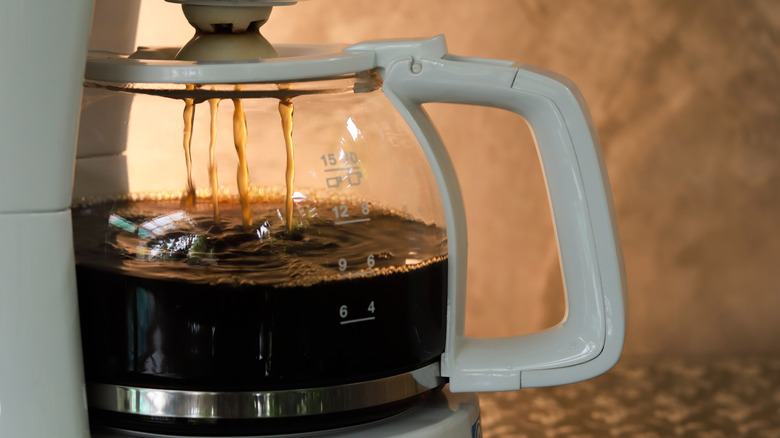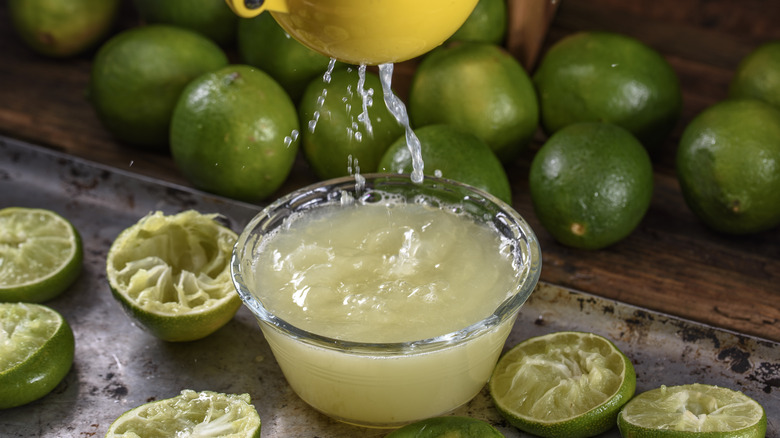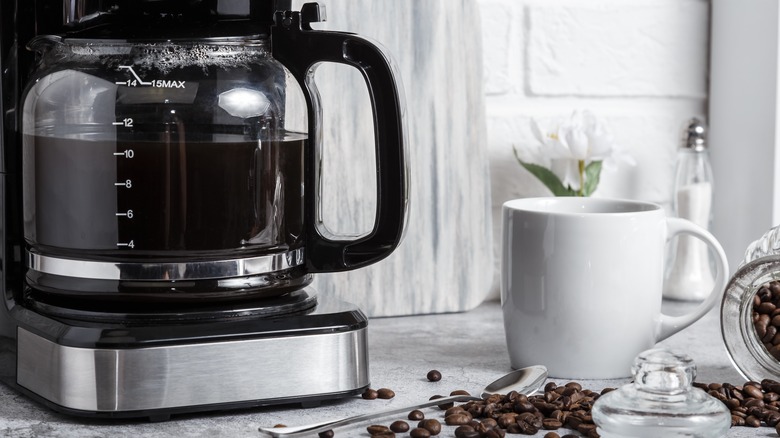The Secret To Easily Cleaning Your Coffee Pot Is In The Fruit Aisle
Coffee is remarkably sensitive to even the smallest of changes. Something as simple as grinding your own coffee beans as opposed to buying pre-ground ones can unlock a treasure trove of flavors that you didn't know you were missing in your brew. Even reducing the amount of coffee grounds you use can lead to a bitter-tasting cup. In fact, coffee is so sensitive that the quality and temperature of water used for brewing can induce noticeable changes.
This underlines the significance of maintaining your coffee maker's cleanliness — it's not only about regular scrubbing with soap and water, but also the crucial task of eliminating calcium, mineral, and limescale deposits. These deposits in coffee makers can result in brews that have an excessively bitter taste and a harsh smell. For optimal results, it is essential to use a powerful cleaner. Surprisingly, one can be found nestled among the fruits and vegetables at your local store, as a dash of lemon or lime juice is all you need.
Lemon or lime juice can rid coffee pots of hard water residues in a jiffy, thanks to their acidity. While white vinegar, with a pH of 2.2, is an excellent cleaning agent, lemon juice, which can have a pH as high as 3, serves as a remarkably effective substitute. As a result, lemon juice is widely considered to be one of the best cleaning agents to use for limescale, mineral, and calcium deposits, making it the go-to citrus fruit for clean coffee makers.
How to clean coffee makers with lemon or lime juice
Not only are lime and lemon juice incredibly handy fixes for coffee makers plagued by hard water deposits, but it's also pretty easy to use them as cleaning agents. Before you begin, however, it's important to run a cycle of plain water through your coffee maker to get rid of any lingering coffee ground residue. Next, you should toss that water out and fill up the coffee pot with a fresh solution of room-temperature water and citrus juice. Allow the acidic solution to sit in the water tank for a few minutes before turning on the coffee maker. As the solution flows through the machine, it will effectively remove any mineral deposits present along its path.
One thing to keep in mind when using this trick is that you only really need about a tablespoon of lemon juice in a tank full of water for the citrus juice to do its job. If the deposits in your coffee maker are particularly stubborn, you can consider adding more juice. Additionally, running another cycle afterward can also be beneficial. Simply toss out the old batch of liquid once it has passed through your coffee maker, make another solution, and run the cycle again. Both homemade and store-bought lemon and lime juice can be utilized for this process, as it is the acidity of the juice, rather than its freshness, that effectively cleans the coffee maker.
Why you need to clean a coffee maker in the first place
Despite the convenience that lemon and lime juice offer for keeping coffee pots clean, one might question the reasons behind their usage in the first place. Every appliance that interacts with water — be it coffee makers, kettles, taps, or dishwashers — is susceptible to the accumulation of mineral and calcium deposits, as well as limescale. These deposits can hide within the water tank, coffee pot, or other hidden areas of the coffee maker that aren't visible to the naked eye. Eliminating these stubborn residues requires something potent and abrasive, which is where the acidity of lime and lemon juice comes in.
If left unchecked for too long, these deposits, which are the result of regular exposure to hard water, can have several implications for your coffee. At the very least, the deposits will affect the quality of your brew, subduing its original flavors for a more bitter and metallic aftertaste. Furthermore, it will affect the formation of the smooth and frothy crema that forms on top of the coffee. These deposits can also build up to the point where no water can pass through the machine. Applying a solution of water mixed with lemon or lime juice is crucial both for maximizing the flavor of your coffee and for ensuring your coffee maker remains in top shape for as long as possible.



